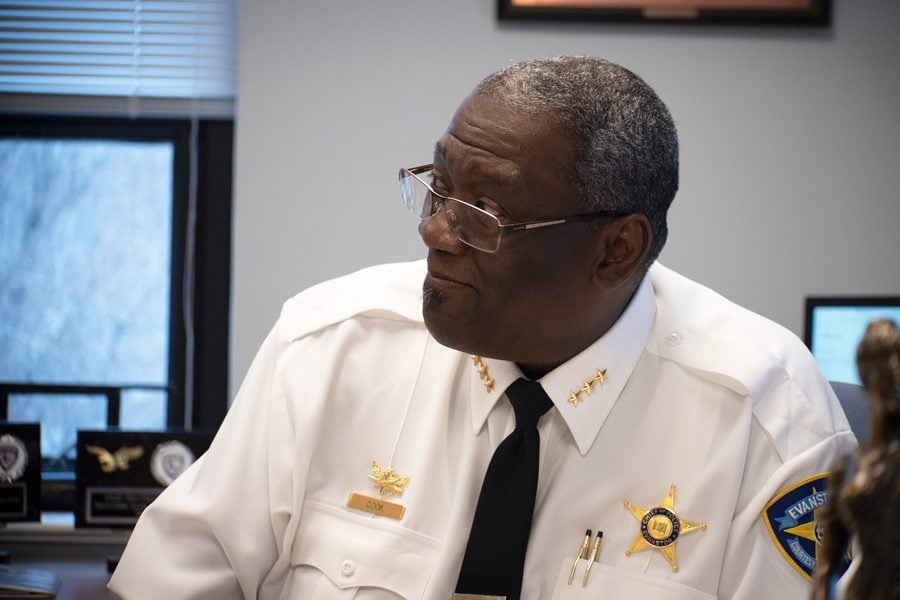Mayor Hagerty discusses complaint process during policing Q&A
Daily file photo by Christopher Vazquez
Police Chief Demitrous Cook. Cook emphasized the importance of residents having options when it comes to ways they can file police complaints.
August 3, 2020
Mayor Steve Hagerty hosted a discussion on the police complaint process on Monday, the fifth in a series of Q&As highlighting policing practices in Evanston.
Residents can make police complaints through a patrol officer, the city website, the department office or the city’s 311 call center, Sergeant Aaron Wernick said. Complaints can be filed anonymously. Once complaint register forms are filled out, the police chief determines whether complaints remain as complaint registers or if become formal complaints. Formal complaints warrant an investigation, even residents intend to file the complaint just to alert the department.
According to Wernick, the chief has final say as far as officers’ discipline. If he decides discipline is warranted, the officer is given a disciplinary action form, which is sent back down the chain of command.
Matthew Mitchell, attorney and former chair of the Citizen Police Complaint Assessment Committee, which was put in place by the mayor and City Council in 2017, worked with committee members to review the city’s complaint process. In 2018, after reaching out to residents and stakeholders, the committee came up with four recommendations.
The first of these recommendations includes an independent intake process, which will be developed in order to avoid the conflict of interest that may be present when police officers review complaints.
“We envision more of a social worker type role who can explain the process objectively and do the intake objectively and then forward that recommendation or forward that complaint to the police department,” Mitchell said.
Although this role has not yet been established, Police Chief Demitrous Cook said he agrees the intake process should make residents feel comfortable coming forth with their complaints and that it was a priority for him when he became chief in early 2019. Now, residents may call into city hall or file complaints through council members.
“We do understand that people may have concerns or fears coming into the police department, and that’s why we felt that decentralization of the complaint process as recommended in Mr. Mitchell’s deal was a good thing to do,” Cook said.
Mitchell also recommended the city implement a new Citizen Police Review Commission. Mayor Hagerty said new members were appointed about a month ago and are currently familiarizing themselves with police protocol.
Another recommendation was the creation of a police auditor position, a resident who would audit investigation and disciplinary practices and make policy recommendations based on what he or she observes.
“I think one of the overall themes of the recommendation of the committee is to have more civilian oversight and civilian involvement in police policy,” Mitchell said.
Mitchell also suggested a mediation program, which would allow police officers and citizens to work out their differences in person. Often when a resident files a complaint against an officer, the police department investigates and does not identify a rule violation. However, the officer’s interaction with the resident still could have been negative.
“The idea is to create more personal relationships in disputes and conflicts as opposed to strictly rule violations,” Mitchell said.
Chief Cook said a mediation program has not been adopted because police officers cannot be forced to comply.
“Either we’re going to discipline a police officer or if we find that there are no rule violations, we can’t make him apologize,” Cook said. “That is my job to invite the citizen in and try to explain what happened.”
Email: [email protected]
Twitter: @juliaa_grace
Related Stories:
— Mayor Hagerty, Cook County police force members discuss police training
— Mayor Hagerty discusses use of force and body cameras at Q & A


